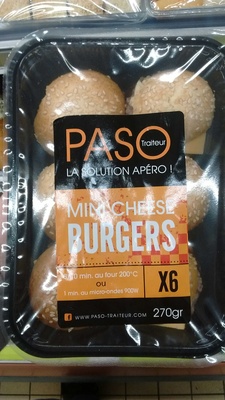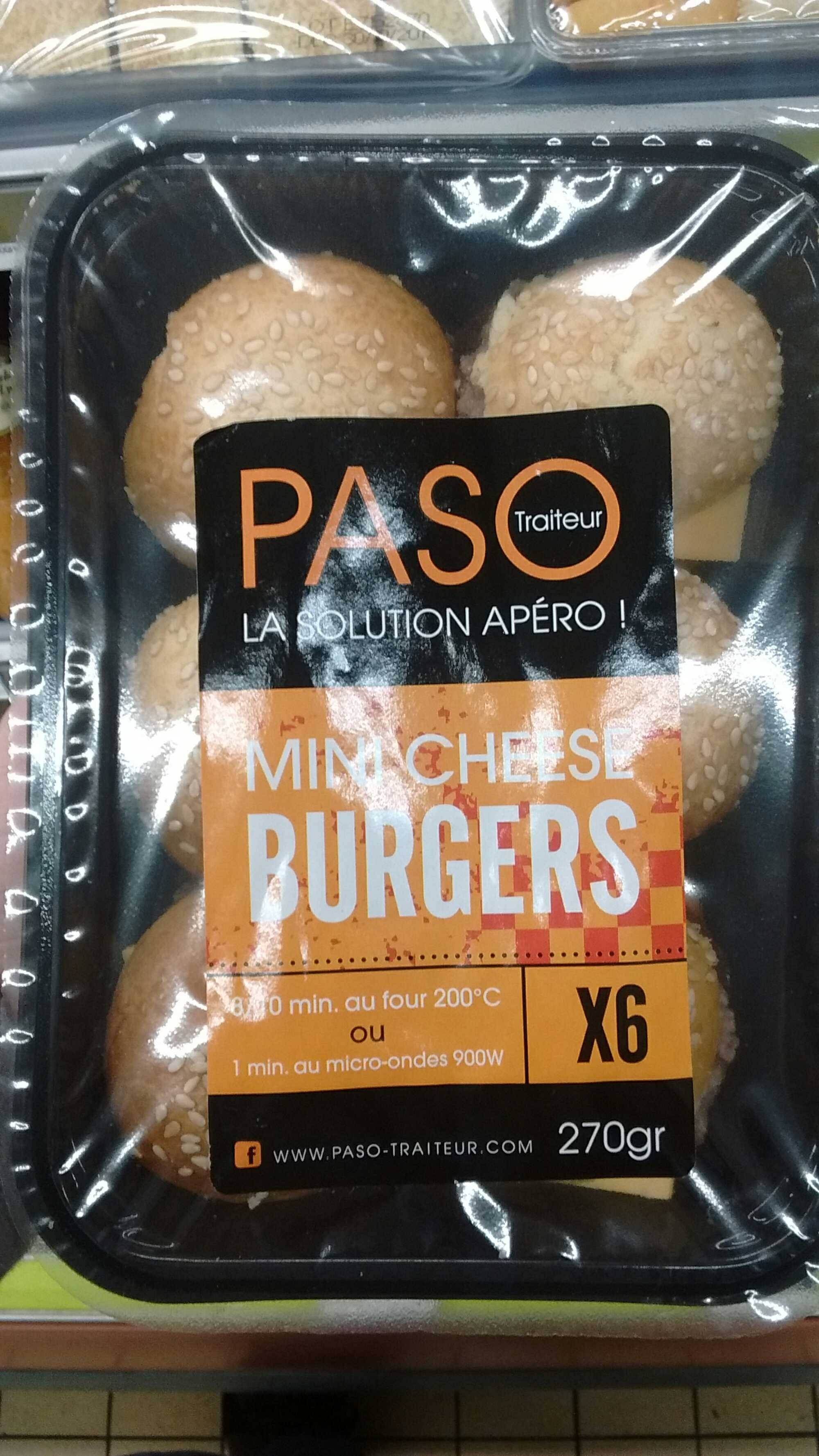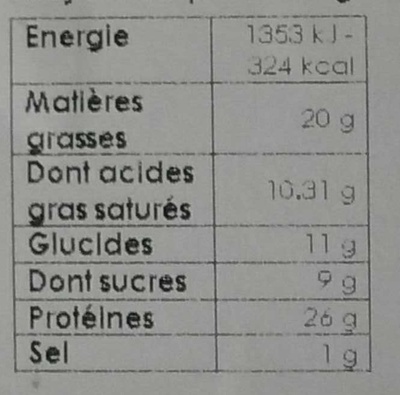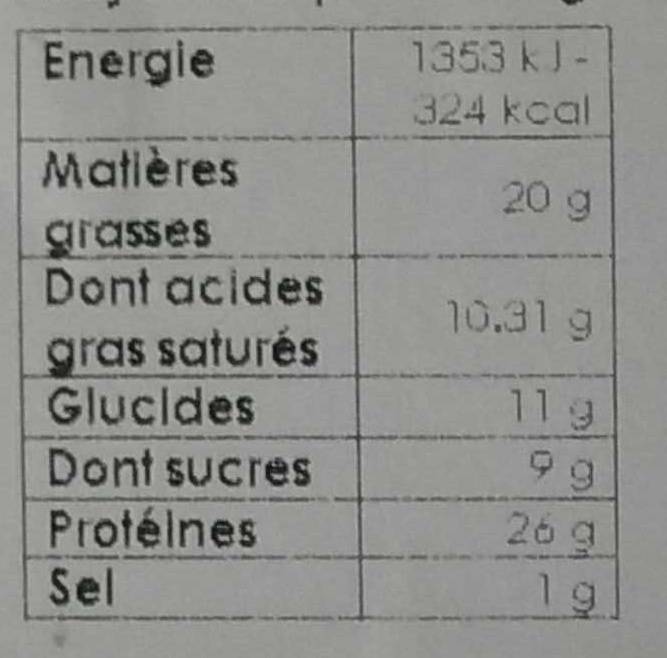Help us make food transparency the norm!
As a non-profit organization, we depend on your donations to continue informing consumers around the world about what they eat.
The food revolution starts with you!
Mini Cheese Burgers - Paso Traiteur - 270 g
Mini Cheese Burgers - Paso Traiteur - 270 g
This product page is not complete. You can help to complete it by editing it and adding more data from the photos we have, or by taking more photos using the app for Android or iPhone/iPad. Thank you!
×
Barcode: 3760114571250 (EAN / EAN-13)
Common name: Mini-brioches garnies d'un steak haché et de cheddar fondu décongelées
Quantity: 270 g
Brands: Paso Traiteur
Categories: Sandwiches, Cheeseburgers
Stores: Carrefour
Countries where sold: France
Matching with your preferences
Health
Ingredients
-
62 ingredients
: Garniture 71 % : steak haché 52 %, cheddar orange fondu 10 % (cheddar orange 50 %, fromages, beurre, eau, protéines de lait, amidon modifié, lactosérum, sels de fonte : E331, gélifiant : E407, arôme, sel, colorant E160b), cornichons, ketchup (tomates, sirop de glucose-fructose, sucre, vinaigre d'alcool, amidon de maïs modifié, sel, arôme naturel, épices). Pain burger 29 % : farine de blé, œufs, sucre, beurre, crème épaisse, margarine (huiles végétales (palme, colza, coco, soja, tournesol), beurre, eau, sel, émulsifiants : lécithine de tournesol, E471, acidifiant : E330, arômes, colorant : E160a), eau, levure, sel, farine de seigle, agent de traitement de la farine : acide ascorbique, émulsifiants : E471, E481, gluten de blé, graines de sésame.Allergens: Eggs, Gluten, Milk, Sesame seeds, SoybeansTraces: Fish, Mustard, Nuts
Food processing
-
Ultra processed foods
Elements that indicate the product is in the 4 - Ultra processed food and drink products group:
- Additive: E14XX - Modified Starch
- Additive: E160a - Carotene
- Additive: E160b - Annatto
- Additive: E322 - Lecithins
- Additive: E407 - Carrageenan
- Additive: E471 - Mono- and diglycerides of fatty acids
- Additive: E481 - Sodium stearoyl-2-lactylate
- Ingredient: Colour
- Ingredient: Emulsifier
- Ingredient: Flavouring
- Ingredient: Gelling agent
- Ingredient: Glucose
- Ingredient: Gluten
- Ingredient: Milk proteins
- Ingredient: Whey
Food products are classified into 4 groups according to their degree of processing:
- Unprocessed or minimally processed foods
- Processed culinary ingredients
- Processed foods
- Ultra processed foods
The determination of the group is based on the category of the product and on the ingredients it contains.
Additives
-
E160a - Carotene
Carotene: The term carotene -also carotin, from the Latin carota, "carrot"- is used for many related unsaturated hydrocarbon substances having the formula C40Hx, which are synthesized by plants but in general cannot be made by animals -with the exception of some aphids and spider mites which acquired the synthesizing genes from fungi-. Carotenes are photosynthetic pigments important for photosynthesis. Carotenes contain no oxygen atoms. They absorb ultraviolet, violet, and blue light and scatter orange or red light, and -in low concentrations- yellow light. Carotenes are responsible for the orange colour of the carrot, for which this class of chemicals is named, and for the colours of many other fruits, vegetables and fungi -for example, sweet potatoes, chanterelle and orange cantaloupe melon-. Carotenes are also responsible for the orange -but not all of the yellow- colours in dry foliage. They also -in lower concentrations- impart the yellow coloration to milk-fat and butter. Omnivorous animal species which are relatively poor converters of coloured dietary carotenoids to colourless retinoids have yellowed-coloured body fat, as a result of the carotenoid retention from the vegetable portion of their diet. The typical yellow-coloured fat of humans and chickens is a result of fat storage of carotenes from their diets. Carotenes contribute to photosynthesis by transmitting the light energy they absorb to chlorophyll. They also protect plant tissues by helping to absorb the energy from singlet oxygen, an excited form of the oxygen molecule O2 which is formed during photosynthesis. β-Carotene is composed of two retinyl groups, and is broken down in the mucosa of the human small intestine by β-carotene 15‚15'-monooxygenase to retinal, a form of vitamin A. β-Carotene can be stored in the liver and body fat and converted to retinal as needed, thus making it a form of vitamin A for humans and some other mammals. The carotenes α-carotene and γ-carotene, due to their single retinyl group -β-ionone ring-, also have some vitamin A activity -though less than β-carotene-, as does the xanthophyll carotenoid β-cryptoxanthin. All other carotenoids, including lycopene, have no beta-ring and thus no vitamin A activity -although they may have antioxidant activity and thus biological activity in other ways-. Animal species differ greatly in their ability to convert retinyl -beta-ionone- containing carotenoids to retinals. Carnivores in general are poor converters of dietary ionone-containing carotenoids. Pure carnivores such as ferrets lack β-carotene 15‚15'-monooxygenase and cannot convert any carotenoids to retinals at all -resulting in carotenes not being a form of vitamin A for this species-; while cats can convert a trace of β-carotene to retinol, although the amount is totally insufficient for meeting their daily retinol needs.Source: Wikipedia
-
E322 - Lecithins
Lecithins are natural compounds commonly used in the food industry as emulsifiers and stabilizers.
Extracted from sources like soybeans and eggs, lecithins consist of phospholipids that enhance the mixing of oil and water, ensuring smooth textures in various products like chocolates, dressings, and baked goods.
They do not present any known health risks.
-
E322i - Lecithin
Lecithins are natural compounds commonly used in the food industry as emulsifiers and stabilizers.
Extracted from sources like soybeans and eggs, lecithins consist of phospholipids that enhance the mixing of oil and water, ensuring smooth textures in various products like chocolates, dressings, and baked goods.
They do not present any known health risks.
-
E330 - Citric acid
Citric acid is a natural organic acid found in citrus fruits such as lemons, oranges, and limes.
It is widely used in the food industry as a flavor enhancer, acidulant, and preservative due to its tart and refreshing taste.
Citric acid is safe for consumption when used in moderation and is considered a generally recognized as safe (GRAS) food additive by regulatory agencies worldwide.
-
E331 - Sodium citrates
Sodium citrate: Sodium citrate may refer to any of the sodium salts of citrate -though most commonly the third-: Monosodium citrate Disodium citrate Trisodium citrateThe three forms of the salt are collectively known by the E number E331. Sodium citrates are used as acidity regulators in food and drinks, and also as emulsifiers for oils. They enable cheeses to melt without becoming greasy.Source: Wikipedia
-
E407 - Carrageenan
Carrageenan (E407), derived from red seaweed, is widely employed in the food industry as a gelling, thickening, and stabilizing agent, notably in dairy and meat products.
It can exist in various forms, each imparting distinct textural properties to food.
However, its degraded form, often referred to as poligeenan, has raised health concerns due to its potential inflammatory effects and its classification as a possible human carcinogen (Group 2B) by the International Agency for Research on Cancer (IARC).
Nevertheless, food-grade carrageenan has been deemed safe by various regulatory bodies when consumed in amounts typically found in food.
-
E471 - Mono- and diglycerides of fatty acids
Mono- and diglycerides of fatty acids (E471), are food additives commonly used as emulsifiers in various processed foods.
These compounds consist of glycerol molecules linked to one or two fatty acid chains, which help stabilize and blend water and oil-based ingredients. E471 enhances the texture and shelf life of products like margarine, baked goods, and ice cream, ensuring a smooth and consistent texture.
It is generally considered safe for consumption within established regulatory limits.
-
E481 - Sodium stearoyl-2-lactylate
Sodium stearoyl lactylate: Sodium stearoyl-2-lactylate -sodium stearoyl lactylate or SSL- is a versatile, FDA approved food additive used to improve the mix tolerance and volume of processed foods. It is one type of a commercially available lactylate. SSL is non-toxic, biodegradable, and typically manufactured using biorenewable feedstocks. Because SSL is a safe and highly effective food additive, it is used in a wide variety of products ranging from baked goods and desserts to pet foods.As described by the Food Chemicals Codex 7th edition, SSL is a cream-colored powder or brittle solid. SSL is currently manufactured by the esterification of stearic acid with lactic acid and partially neutralized with either food-grade soda ash -sodium carbonate- or caustic soda -concentrated sodium hydroxide-. Commercial grade SSL is a mixture of sodium salts of stearoyl lactylic acids and minor proportions of other sodium salts of related acids. The HLB for SSL is 10-12. SSL is slightly hygroscopic, soluble in ethanol and in hot oil or fat, and dispersible in warm water. These properties are the reason that SSL is an excellent emulsifier for fat-in-water emulsions and can also function as a humectant.Source: Wikipedia
Ingredients analysis
-
Palm oil
Ingredients that contain palm oil: Palm oil
-
Non-vegan
Non-vegan ingredients: Meat patty, fr:Cheddar orange fondu, Red cheddar, Cheese, Butter, Milk proteins, Whey, Egg, Butter, fr:Crème épaisse, ButterSome ingredients could not be recognized.
We need your help!
You can help us recognize more ingredients and better analyze the list of ingredients for this product and others:
- Edit this product page to correct spelling mistakes in the ingredients list, and/or to remove ingredients in other languages and sentences that are not related to the ingredients.
- Add new entries, synonyms or translations to our multilingual lists of ingredients, ingredient processing methods, and labels.
If you would like to help, join the #ingredients channel on our Slack discussion space and/or learn about ingredients analysis on our wiki. Thank you!
-
Non-vegetarian
Non-vegetarian ingredients: Meat pattySome ingredients could not be recognized.
We need your help!
You can help us recognize more ingredients and better analyze the list of ingredients for this product and others:
- Edit this product page to correct spelling mistakes in the ingredients list, and/or to remove ingredients in other languages and sentences that are not related to the ingredients.
- Add new entries, synonyms or translations to our multilingual lists of ingredients, ingredient processing methods, and labels.
If you would like to help, join the #ingredients channel on our Slack discussion space and/or learn about ingredients analysis on our wiki. Thank you!
-
Details of the analysis of the ingredients
We need your help!
Some ingredients could not be recognized.
We need your help!
You can help us recognize more ingredients and better analyze the list of ingredients for this product and others:
- Edit this product page to correct spelling mistakes in the ingredients list, and/or to remove ingredients in other languages and sentences that are not related to the ingredients.
- Add new entries, synonyms or translations to our multilingual lists of ingredients, ingredient processing methods, and labels.
If you would like to help, join the #ingredients channel on our Slack discussion space and/or learn about ingredients analysis on our wiki. Thank you!
: Garniture 71% (steak haché 52%), cheddar orange fondu 10% (cheddar orange 50%, fromages, beurre, eau, protéines de lait, amidon modifié, lactosérum, sels de fonte (e331), gélifiant (e407), arôme, sel, colorant (e160b)), cornichons, ketchup (tomates, sirop de glucose-fructose, sucre, vinaigre d'alcool, amidon de maïs modifié, sel, arôme naturel, épices), Pain burger 29% (farine de blé), œufs, sucre, beurre, crème épaisse, margarine (huiles végétales de palme, huiles végétales de colza, huiles végétales de coco, huiles végétales de soja, huiles végétales de tournesol, beurre, eau, sel, émulsifiants (lécithine de tournesol), e471, acidifiant (e330), arômes, colorant (e160a)), eau, levure, sel, farine de seigle, agent de traitement de la farine (acide ascorbique), émulsifiants (e471), e481, gluten de blé, graines de sésame- Garniture -> en:filling - vegan: maybe - vegetarian: maybe - percent: 71
- steak haché -> en:meat-patty - vegan: no - vegetarian: no - percent: 52
- cheddar orange fondu -> fr:cheddar-orange-fondu - vegan: no - vegetarian: maybe - ciqual_food_code: 12726 - percent: 10
- cheddar orange -> en:red-cheddar - vegan: no - vegetarian: maybe - ciqual_food_code: 12726 - percent: 50
- fromages -> en:cheese - vegan: no - vegetarian: maybe - ciqual_proxy_food_code: 12999
- beurre -> en:butter - vegan: no - vegetarian: yes - ciqual_proxy_food_code: 16400
- eau -> en:water - vegan: yes - vegetarian: yes - ciqual_food_code: 18066
- protéines de lait -> en:milk-proteins - vegan: no - vegetarian: yes
- amidon modifié -> en:modified-starch - vegan: yes - vegetarian: yes - ciqual_proxy_food_code: 9510
- lactosérum -> en:whey - vegan: no - vegetarian: maybe
- sels de fonte -> en:emulsifying-salts
- e331 -> en:e331 - vegan: yes - vegetarian: yes
- gélifiant -> en:gelling-agent
- e407 -> en:e407 - vegan: yes - vegetarian: yes
- arôme -> en:flavouring - vegan: maybe - vegetarian: maybe
- sel -> en:salt - vegan: yes - vegetarian: yes - ciqual_food_code: 11058
- colorant -> en:colour
- e160b -> en:e160b - vegan: yes - vegetarian: yes
- cornichons -> en:gherkin - vegan: yes - vegetarian: yes - ciqual_proxy_food_code: 11004
- ketchup -> en:ketchup - vegan: maybe - vegetarian: maybe - ciqual_food_code: 11008
- tomates -> en:tomato - vegan: yes - vegetarian: yes - ciqual_food_code: 20047
- sirop de glucose-fructose -> en:glucose-fructose-syrup - vegan: yes - vegetarian: yes - ciqual_food_code: 31077
- sucre -> en:sugar - vegan: yes - vegetarian: yes - ciqual_proxy_food_code: 31016
- vinaigre d'alcool -> en:alcohol-vinegar - vegan: yes - vegetarian: yes - ciqual_food_code: 11018
- amidon de maïs modifié -> en:modified-corn-starch - vegan: yes - vegetarian: yes - ciqual_food_code: 9510
- sel -> en:salt - vegan: yes - vegetarian: yes - ciqual_food_code: 11058
- arôme naturel -> en:natural-flavouring - vegan: maybe - vegetarian: maybe
- épices -> en:spice - vegan: yes - vegetarian: yes
- Pain burger -> fr:pain-burger - percent: 29
- farine de blé -> en:wheat-flour - vegan: yes - vegetarian: yes - ciqual_proxy_food_code: 9410
- œufs -> en:egg - vegan: no - vegetarian: yes - ciqual_food_code: 22000
- sucre -> en:sugar - vegan: yes - vegetarian: yes - ciqual_proxy_food_code: 31016
- beurre -> en:butter - vegan: no - vegetarian: yes - ciqual_proxy_food_code: 16400
- crème épaisse -> fr:creme-epaisse - vegan: no - vegetarian: yes - ciqual_food_code: 19402
- margarine -> en:margarine
- huiles végétales de palme -> en:palm-oil - vegan: yes - vegetarian: yes - from_palm_oil: yes - ciqual_food_code: 16129
- huiles végétales de colza -> en:colza-oil - vegan: yes - vegetarian: yes - from_palm_oil: no - ciqual_food_code: 17130
- huiles végétales de coco -> en:coconut-oil - vegan: yes - vegetarian: yes - from_palm_oil: no - ciqual_food_code: 16040
- huiles végétales de soja -> en:soya-oil - vegan: yes - vegetarian: yes - from_palm_oil: no - ciqual_food_code: 17420
- huiles végétales de tournesol -> en:sunflower-oil - vegan: yes - vegetarian: yes - from_palm_oil: no - ciqual_food_code: 17440
- beurre -> en:butter - vegan: no - vegetarian: yes - ciqual_proxy_food_code: 16400
- eau -> en:water - vegan: yes - vegetarian: yes - ciqual_food_code: 18066
- sel -> en:salt - vegan: yes - vegetarian: yes - ciqual_food_code: 11058
- émulsifiants -> en:emulsifier
- lécithine de tournesol -> en:sunflower-lecithin - vegan: yes - vegetarian: yes
- e471 -> en:e471 - vegan: maybe - vegetarian: maybe - from_palm_oil: maybe
- acidifiant -> en:acid
- e330 -> en:e330 - vegan: yes - vegetarian: yes
- arômes -> en:flavouring - vegan: maybe - vegetarian: maybe
- colorant -> en:colour
- e160a -> en:e160a - vegan: maybe - vegetarian: maybe - from_palm_oil: maybe
- eau -> en:water - vegan: yes - vegetarian: yes - ciqual_food_code: 18066
- levure -> en:yeast - vegan: yes - vegetarian: yes
- sel -> en:salt - vegan: yes - vegetarian: yes - ciqual_food_code: 11058
- farine de seigle -> en:rye-flour - vegan: yes - vegetarian: yes - ciqual_proxy_food_code: 9532
- agent de traitement de la farine -> en:flour-treatment-agent
- acide ascorbique -> en:e300 - vegan: yes - vegetarian: yes
- émulsifiants -> en:emulsifier
- e471 -> en:e471 - vegan: maybe - vegetarian: maybe - from_palm_oil: maybe
- e481 -> en:e481 - vegan: maybe - vegetarian: maybe - from_palm_oil: maybe
- gluten de blé -> en:wheat-gluten - vegan: yes - vegetarian: yes
- graines de sésame -> en:sesame-seeds - vegan: yes - vegetarian: yes - ciqual_food_code: 15010
Nutrition
-
Bad nutritional quality
⚠ ️Warning: the amount of fiber is not specified, their possible positive contribution to the grade could not be taken into account.⚠ ️Warning: the amount of fruits, vegetables and nuts is not specified on the label, it was estimated from the list of ingredients: 11This product is not considered a beverage for the calculation of the Nutri-Score.
Positive points: 0
- Proteins: 5 / 5 (value: 26, rounded value: 26)
- Fiber: 0 / 5 (value: 0, rounded value: 0)
- Fruits, vegetables, nuts, and colza/walnut/olive oils: 0 / 5 (value: 11.875, rounded value: 11.9)
Negative points: 19
- Energy: 4 / 10 (value: 1353, rounded value: 1353)
- Sugars: 1 / 10 (value: 9, rounded value: 9)
- Saturated fat: 10 / 10 (value: 10.31, rounded value: 10.3)
- Sodium: 4 / 10 (value: 400, rounded value: 400)
The points for proteins are not counted because the negative points are greater or equal to 11.
Nutritional score: (19 - 0)
Nutri-Score:
-
Nutrient levels
-
Fat in moderate quantity (20%)
What you need to know- A high consumption of fat, especially saturated fats, can raise cholesterol, which increases the risk of heart diseases.
Recommendation: Limit the consumption of fat and saturated fat- Choose products with lower fat and saturated fat content.
-
Saturated fat in high quantity (10.3%)
What you need to know- A high consumption of fat, especially saturated fats, can raise cholesterol, which increases the risk of heart diseases.
Recommendation: Limit the consumption of fat and saturated fat- Choose products with lower fat and saturated fat content.
-
Sugars in moderate quantity (9%)
What you need to know- A high consumption of sugar can cause weight gain and tooth decay. It also augments the risk of type 2 diabetes and cardio-vascular diseases.
Recommendation: Limit the consumption of sugar and sugary drinks- Sugary drinks (such as sodas, fruit beverages, and fruit juices and nectars) should be limited as much as possible (no more than 1 glass a day).
- Choose products with lower sugar content and reduce the consumption of products with added sugars.
-
Salt in moderate quantity (1%)
What you need to know- A high consumption of salt (or sodium) can cause raised blood pressure, which can increase the risk of heart disease and stroke.
- Many people who have high blood pressure do not know it, as there are often no symptoms.
- Most people consume too much salt (on average 9 to 12 grams per day), around twice the recommended maximum level of intake.
Recommendation: Limit the consumption of salt and salted food- Reduce the quantity of salt used when cooking, and don't salt again at the table.
- Limit the consumption of salty snacks and choose products with lower salt content.
-
-
Nutrition facts
Nutrition facts As sold
for 100 g / 100 mlCompared to: Cheeseburgers Energy 1,353 kj
(324 kcal)+23% Fat 20 g +57% Saturated fat 10.31 g +92% Carbohydrates 11 g -53% Sugars 9 g +118% Fiber ? Proteins 26 g +98% Salt 1 g -28% Fruits‚ vegetables‚ nuts and rapeseed‚ walnut and olive oils (estimate from ingredients list analysis) 11.875 %
Environment
-
Eco-Score E - Very high environmental impact
⚠ ️Select a country in order to include the full impact of transportation.The Eco-Score is an experimental score that summarizes the environmental impacts of food products.→ The Eco-Score was initially developped for France and it is being extended to other European countries. The Eco-Score formula is subject to change as it is regularly improved to make it more precise and better suited to each country.Life cycle analysis
-
Average impact of products of the same category: E (Score: 15/100)
Category: Cheeseburger, from fast foods restaurant
Category: Cheeseburger, from fast foods restaurant
- PEF environmental score: 1.78 (the lower the score, the lower the impact)
- including impact on climate change: 17.72 kg CO2 eq/kg of product
Stage Impact Agriculture
92.3 %Processing
3.3 %Packaging
1.0 %Transportation
0.9 %Distribution
0.5 %Consumption
1.9 %
Bonuses and maluses
-
Missing origins of ingredients information
Malus: -5
⚠ ️ The origins of the ingredients of this product are not indicated.
If they are indicated on the packaging, you can modify the product sheet and add them.
If you are the manufacturer of this product, you can send us the information with our free platform for producers.
-
Ingredients that threatens species
Malus: -10
Contains palm oil
Tropical forests in Asia, Africa and Latin America are destroyed to create and expand oil palm tree plantations. The deforestation contributes to climate change, and it endangers species such as the orangutan, the pigmy elephant and the Sumatran rhino.
-
Packaging with a medium impact
Malus: -10
Shape Material Recycling Impact Tray Plastic High
Eco-Score for this product
-
Impact for this product: E (Score: -10/100)
Product: Mini Cheese Burgers - Paso Traiteur - 270 g
Life cycle analysis score: 15
Sum of bonuses and maluses: -25
Final score: -10/100
-
Carbon footprint
-
Equal to driving 9.2 km in a petrol car
1772 g CO² per 100g of product
The carbon emission figure comes from ADEME's Agribalyse database, for the category: Cheeseburger, from fast foods restaurant (Source: ADEME Agribalyse Database)
Stage Impact Agriculture
94.7 %Processing
1.8 %Packaging
1.6 %Transportation
1.2 %Distribution
0.2 %Consumption
0.5 %
Packaging
-
Packaging with a medium impact
-
Packaging parts
Tray (Plastic)
-
Packaging materials
Material % Packaging weight Packaging weight per 100 g of product Plastic
-
Transportation
-
Origins of ingredients
Missing origins of ingredients information
⚠ ️ The origins of the ingredients of this product are not indicated.
If they are indicated on the packaging, you can modify the product sheet and add them.
If you are the manufacturer of this product, you can send us the information with our free platform for producers.Add the origins of ingredients for this product Add the origins of ingredients for this product
Threatened species
-
Contains palm oil
Drives deforestation and threatens species such as the orangutan
Tropical forests in Asia, Africa and Latin America are destroyed to create and expand oil palm tree plantations. The deforestation contributes to climate change, and it endangers species such as the orangutan, the pigmy elephant and the Sumatran rhino.
Report a problem
-
Incomplete or incorrect information?
Category, labels, ingredients, allergens, nutritional information, photos etc.
If the information does not match the information on the packaging, please complete or correct it. Open Food Facts is a collaborative database, and every contribution is useful for all.
Data sources
Product added on by tacite
Last edit of product page on by packbot.
Product page also edited by elttor, quechoisir.










